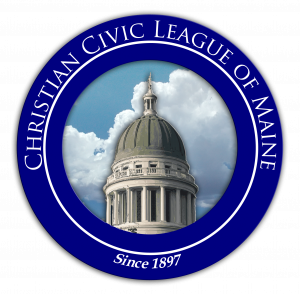Chairperson Katz and Pierce, distinguished members of the Select Committee on Marijuana Legalization and Implementation:
Thank you for the opportunity to speak today. My name is Carroll Conley, and I’m the executive director of the Christian Civic League of Maine. I want to publicly thank the committee members and staff for their work on this very difficult assignment. Your willingness to take on this task in the summer after a long and contentious legislative session is truly exemplary public service.
The Christian Civic League was founded in 1897 when the president of Bowdoin College called a convention for the churches of Maine to address a serious alcohol issue on our state’s college campuses. Here we are over a century later in the throes of another substance abuse crisis.
Against the overwhelming warnings and advice of Maine public health, medical, and law enforcement professionals, the people of Maine voted to legalize recreational marijuana by the narrowest of margins. In light of the indisputable evidence this decision will make our highways and workplaces less safe and our youth more vulnerable to substance abuse – – I call upon this committee and the legislature to show the same courage and leadership to either repeal or significantly alter this referendum just as you did with other referendum questions in the recent session.
Some of the greatest challenges and vulnerabilities this process has exposed are in the area of existing medical marijuana statutes. Our organization does not take a position on the concept of medical marijuana, but we have great concerns about irresponsible regulations that create gaping loopholes that compromise public safety and municipal sovereignty.
Of all the concerns that have been raised today, the option of allowing medical marijuana dispensaries and caregivers to sell recreational pot is most alarming.I’ve personally visited the All Saints School in Bangor with a pot shop located right next door. I’ve spoken to the school principal who has grave concerns about the safety of the students in the school that is located in one of the city’s most challenging neighborhoods.
I hold in my hand a letter from the Maine Municipal Association instructing a town manager how to ignore the will of its citizens on a technicality. This town’s citizens voted 2-1 against pot legalization this fall and are attempting to “go dry” via a petition drive. The threat to municipal sovereignty is real.
In light of these incidences, which are not isolated, private and public comments by committee members assuring that these issues “will be taken care of” frankly do not assuage our concerns.
As I said at the beginning of my testimony, you’ve accepted a difficult and thankless task. During this process, you have predominantly heard from a well-funded lobby who is well aware of the profits at stake for a big marijuana. I thank you for the opportunity for those of us who do think there’s not enough money in the world that could justify throwing gas on the substance-abuse fire that is presently consuming our citizens.

